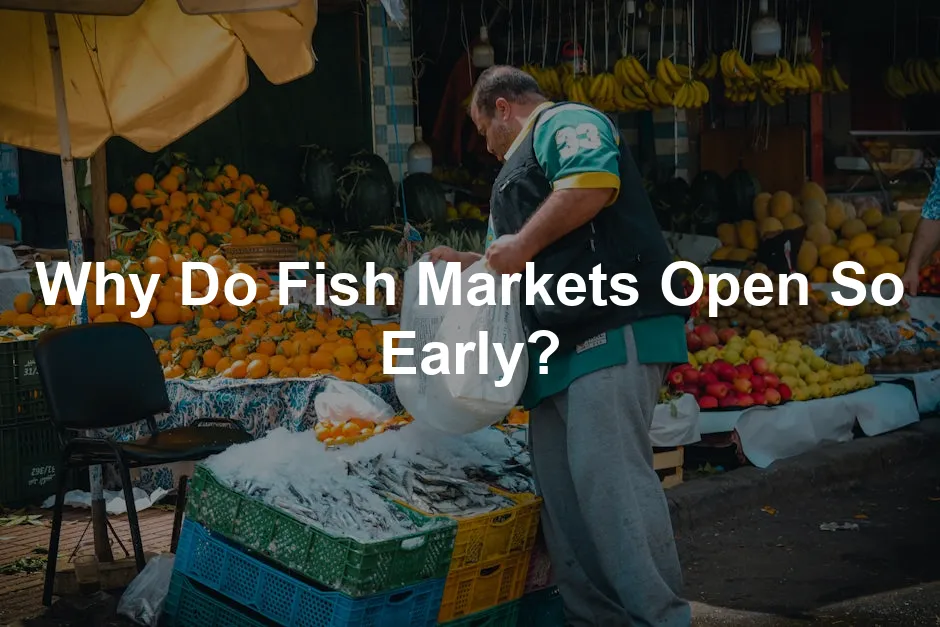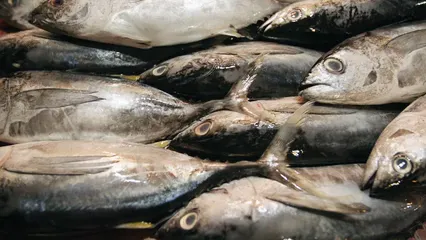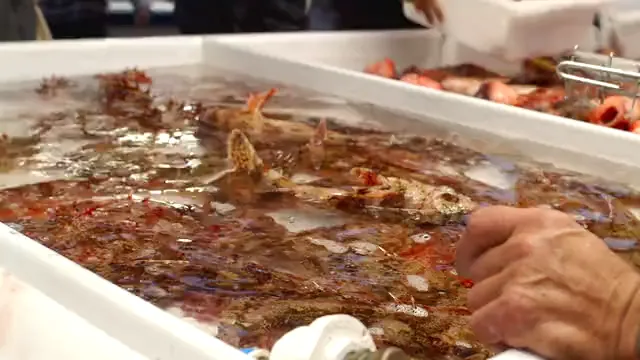
Why Do Fish Markets Open So Early?
Introduction
Have you ever wondered why fish markets open before sunrise? These bustling hubs of activity greet early risers with a vibrant atmosphere. The air is filled with the sounds of vendors calling out their freshest catches. Early morning hours hold significant importance for both sellers and buyers in this unique marketplace.
If you’re planning to whip up a seafood feast at home, having the right tools is essential! Check out this Fish Fillet Knife that will make your preparation a breeze. After all, nobody wants to wrestle with their dinner!
Summary and Overview
Fish markets have a rich history, dating back centuries. These markets evolved from simple trading posts to vital commercial centers. They serve as cultural landmarks in coastal towns and cities worldwide, reflecting local traditions and practices.
Opening early benefits sellers by ensuring they offer the freshest seafood. Buyers, especially restaurant owners and home cooks, appreciate the quality that comes with being first in line. Early hours allow vendors to sell their products before the heat of the day affects freshness.
Speaking of freshness, why not elevate your grilling experience with this Seafood Grill Basket? It’s perfect for keeping your delicate seafood from slipping through the cracks while you grill to perfection!
Around the globe, fish markets vary in size and style. From small local stalls to grand, bustling markets like the famous Tsukiji in Tokyo, each has its charm. The common thread remains: an early start leads to vibrant commerce and community engagement. This sets the stage for a deeper exploration of why these markets operate at such hours.

The Importance of Freshness
Why Freshness Matters
Fish and seafood are highly perishable. They can spoil quickly if not handled properly. This perishability makes freshness crucial for both taste and safety. When you buy seafood, you want it at its best. Early openings at fish markets help ensure that you get the freshest products.
Imagine biting into a piece of fish that’s just come from the ocean. That burst of flavor is what consumers seek. Many expect to find high-quality, fresh seafood when they visit these markets. Vendors know this expectation drives sales, so they rise early to provide the best selection.
In bustling markets worldwide, the first transactions often set the tone for the day. Customers flock to stalls, excited to purchase the catch of the day. This freshness not only guarantees quality but also builds trust between vendors and customers. When you buy at dawn, you’re investing in quality assurance, ensuring you bring home the best seafood for your meals.
To help you keep your seafood fresh, consider using Fish Storage Bags that are designed to keep your catches fresh for longer. Because who wants to deal with spoiled seafood, right?
Understanding the significance of freshness in fish markets can enhance your appreciation for seafood quality. why do fish markets open so early

Historical Context
Evolution of Fish Markets
Fish markets have played a vital role in trade for centuries. They originated as simple gathering spots for fishermen to sell their catches. Over time, these markets transformed into bustling commercial centers. The historical significance of fish markets can’t be understated; they shaped local economies and fostered community ties.
For instance, the famous Tsukiji Fish Market in Tokyo dates back to 1935. It became renowned for its variety and quality, attracting tourists and chefs alike. Similarly, the Billingsgate Market in London has operated since the 17th century, evolving into the largest inland fish market in the UK.
Many historical practices still influence today’s operations. Early morning auctions remain common, ensuring that fresh fish reaches consumers swiftly. This tradition highlights the cultural significance of fish markets, connecting generations of fishermen and shoppers.
By understanding the rich history behind these markets, we appreciate their ongoing importance in our communities. And if you want to dive deeper into seafood cooking, consider picking up a Cookbook: “The Complete Seafood Cookbook”. It’s packed with delicious recipes that will elevate your seafood game!

Economic Factors
Supply and Demand
Fish markets open early to meet high demand for fresh seafood. Restaurants and households prioritize freshness, making early hours crucial. This timing allows vendors to sell their catches before the day’s heat affects quality.
Fishermen benefit significantly from these early openings. They can move their stock quickly, ensuring minimal spoilage. This efficiency translates into better prices and higher sales volume. A study showed that early market hours can increase seafood sales by up to 30%, highlighting the economic advantages for vendors.
Moreover, seafood’s popularity continues to rise, driven by consumer trends toward healthier eating. As more people seek fresh fish, markets that open early stand out. This dynamic benefits both vendors and consumers, creating a thriving marketplace full of activity and opportunity.

Cultural Significance
Community and Tradition
Fish markets are more than just places to buy seafood. They serve as vibrant cultural hubs and community gathering spots. In many coastal towns, these markets reflect local traditions and community practices.
Take the famous Hamburg Fish Market, for example. Every Sunday, it draws thousands of early risers. Visitors not only shop for fresh fish but also enjoy live music and local delicacies. This lively atmosphere fosters a sense of belonging among attendees.
Tradition plays a key role in how these markets operate. Many have been around for centuries, maintaining age-old practices. For instance, in Tokyo’s Tsukiji Market, the morning fish auction remains a cherished ritual, attracting locals and tourists alike.
If you’re planning to prepare a feast, don’t forget to grab some Seafood Seasoning Set. The right spices can make all the difference in bringing out those fresh flavors!
Additionally, these markets often host special events that celebrate local culture. In Taiwan, the Donggang Fish Market features festivals tied to fishing traditions. Such events foster community spirit and highlight cultural heritage.
Fish markets also offer a unique opportunity for social interaction. Vendors and customers build relationships that span generations. These connections enrich the shopping experience, turning a simple transaction into a community event.
In essence, fish markets are vital to community identity. They link people to their cultural roots while providing fresh seafood and fostering social ties. Visiting these markets gives you a taste of local life, making it a worthwhile experience.

Logistics and Operations
The Daily Routine of Fish Markets
Fish market vendors start their day before dawn. They often arrive by 2 or 3 a.m. This ensures they can prepare for the day’s sales. Fresh fish comes from local fishermen, who deliver their catches as early as possible. The timing is essential to keep the seafood fresh and appealing.
Transportation plays a vital role in these operations. Fishermen use trucks to move their products swiftly from the docks to the market. This logistics chain ensures that seafood reaches vendors quickly, minimizing spoilage. Efficient transport methods, like refrigerated trucks, help preserve quality.
Once at the market, vendors set up their stalls, displaying their catches. The atmosphere is bustling, with vendors calling out to attract buyers. Early openings allow them to serve both restaurants and home cooks. By selling early, they secure the best sales before other markets open.
After your shopping trip, you might want to try out your cooking skills with a Cast Iron Skillet. It’s perfect for searing fish to achieve that delightful crust!

Competition with Other Markets
Why Fish Markets Stand Out
Fish markets differ from other food markets, like farmers markets or supermarkets. While farmers markets offer fresh produce, fish markets focus solely on seafood. This specialization attracts customers seeking high-quality fish.
Opening early gives fish markets a competitive advantage. It allows vendors to capture the attention of chefs and seafood enthusiasts. Many chefs prefer to buy fish directly from the source, ensuring freshness for their dishes.
Moreover, fish markets offer unique products that other markets may not. Specialty items, like live seafood or rare fish species, draw in curious shoppers. This distinctiveness enhances their appeal, making early visits worthwhile for customers.

Customer Experience
Shopping at Fish Markets
Shopping early at fish markets is an experience like no other. The atmosphere is lively, filled with the sounds of bustling vendors and eager customers. You can interact directly with the sellers, often leading to valuable tips on cooking and preparation.
Early shoppers enjoy the freshest selections available. Many markets offer samples, allowing customers to taste before buying. This personal touch creates a friendly, welcoming environment. Plus, arriving early means less crowding, making your shopping trip more enjoyable.
Additionally, exploring fish markets can be a social experience. You might meet fellow food lovers who share your passion for seafood. Engaging with vendors fosters connections that can enhance your culinary adventures, making each visit memorable.
To make your seafood preparation easier, consider investing in Seafood Utensil Set. It can help you tackle any seafood dish with ease!

Conclusion
Fish markets open early for several key reasons. Freshness is paramount, ensuring the seafood is of the highest quality. The logistics of getting fish from sea to market require precise timing. Furthermore, early hours provide a competitive edge against other food markets.
These markets also serve as community hubs, connecting people through shared traditions and experiences. If you haven’t visited your local fish market early, consider doing so. The vibrant atmosphere and fresh offerings await you! And don’t forget to check out a Digital Kitchen Scale to ensure you’re measuring your ingredients just right!

FAQs
Why do fish markets open so early in the morning?
Early openings ensure freshness, support supply chain logistics, and meet customer demand for high-quality seafood.
What time do fish markets typically close?
Closing times vary, but many markets close by 9:30 a.m. Some may have different hours on weekends or holidays.
Please let us know what you think about our content by leaving a comment down below!
Thank you for reading till here 🙂 And if you’re ever feeling adventurous, grab a Portable Electric Smoker to bring those flavors to life!
All images from Pexels




